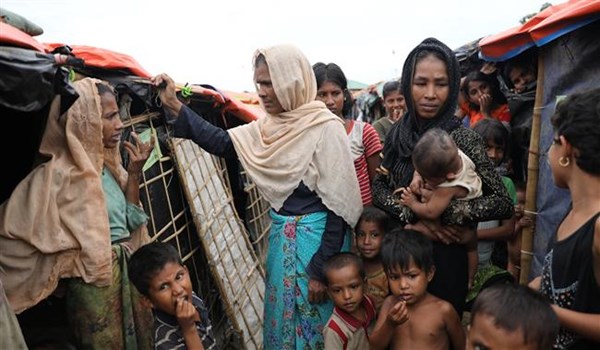
RNA - In an interview from Balukhali refugee camp in Cox's Bazar, Yanghee Lee, a UN special rapporteur who was banned from visiting Myanmar, stressed that with Bangladesh's monsoon season approaching, the crammed camps "will be witnessing landslides and we may see a huge number of casualties", Al-Jazeera reported.
Lee also warned of the possibility of an "outbreak of diseases" that would spread due to heavy rainfall, which may become "impossible to contain from spreading elsewhere".
Lee urged the international community to aid in dispersing the overcrowded camps in Bangladesh, saying "The concentration of people... it's just not human".
As part of the repatriation deal signed by the two Asian neighbours in November last year, Bangladesh and Myanmar officials agreed last week on plans to facilitate the return, over the next two years, of those displaced.
Some 1,550 refugees will be sent back each week, which will add up to approximately 156,000 over a period of two years.
But Lee said the situation in Myanmar is not conducive for refugees to return.
"First of all, where would they go back to? They've lost their livelihood, they've lost their crops, they've lost their fields," she added.
"All the rice now is reportedly being sold elsewhere to other countries. They've lost their homes, so the rebuilding process is going to be huge, and the people should not be subjected to living in another camp-like situation," Lee underlined.
She also urged that the return of any refugees to their homes be entirely voluntary, stressing there needs to be "informed consent... so they will know exactly what they are going back to".
Bangladesh and Myanmar agreed to repatriate the hundreds of thousands of Rohingya Muslims who have fled a recent army crackdown in Myanmar within a period of two years.
The United Nations refugee agency stressed that Rohingya Muslim refugees in Bangladesh should be consulted and ensured of their safety before they are repatriated to Myanmar’s Rakhine state.
Concerns are growing among United Nations agencies and humanitarian groups over an agreement between the Bangladesh and Myanmar governments to repatriate several hundred thousand Rohingya refugees within two years.
The UN secretary general, Antonio Guterres, said the repatriation deal needed to clarify whether Rohingya would be permitted to return to their homes or live in specially built camps.
“The worst would be to move these people from camps in Bangladesh to camps in Myanmar,” Guterres stressed.
The deal included no role for the UN refugee agency, he added, making it difficult to “guarantee that the operation abides by international standards.”
Amnesty International described plans to return the Rohingya refugees in Bangladesh as “alarmingly premature.”
More than 655,000 of Myanmar's Muslim minority have fled across the border to Bangladesh since late August when the Myanmar army launched a sweeping crackdown on Rohingya Muslims in Northern Rakhine state.
The UN has already described the Rohingya as the most persecuted community in the world, calling the situation in Rakhine similar to “a textbook example of ethnic cleansing.”
The Myanmarese government, however, denies committing atrocities against the Rohingya people and has even rejected UN criticism for its “politicization and partiality.”
UN High Commissioner for Human Rights Zeid Ra‘ad al-Hussein stressed that attacks on the Rohingya had been “well thought out and planned” and he had asked Myanmar’s de facto leader to do more to stop the military atrocities.
847/940